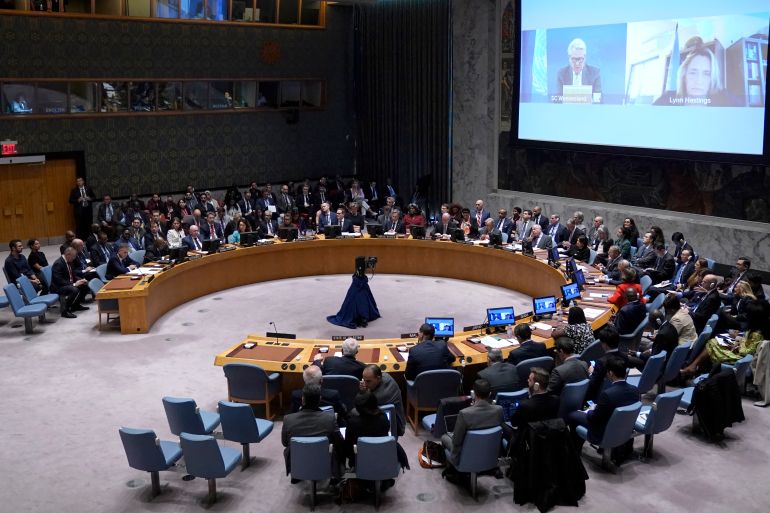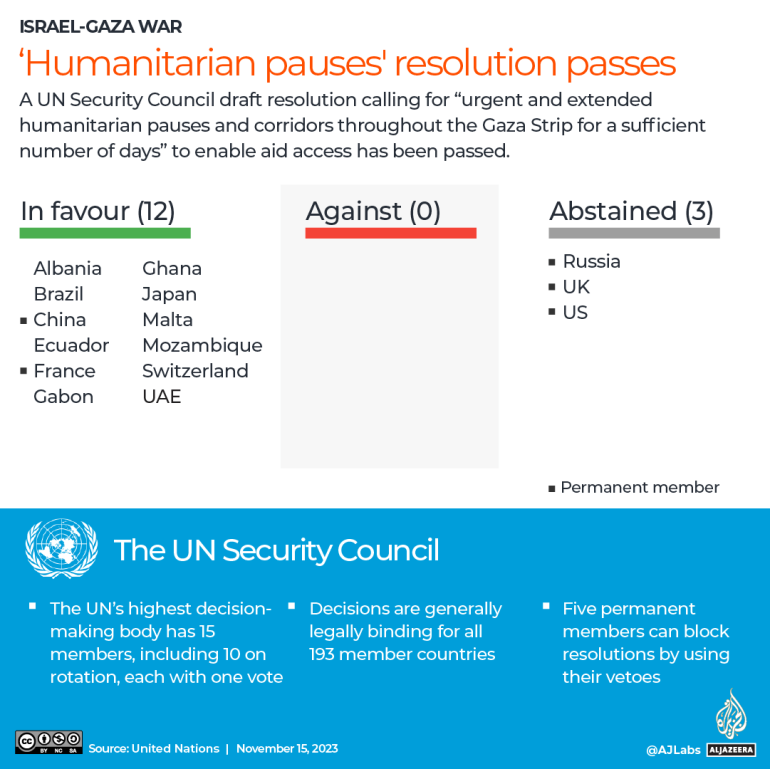UN Security Council adopts resolution for ‘humanitarian pauses’ in Gaza
The 15-member body approved the Malta-sponsored draft after four failed attempts to respond to Israel-Hamas war.

The UN Security Council has passed a resolution calling for “urgent and extended humanitarian pauses and corridors throughout the Gaza Strip” to allow for aid delivery and medical evacuations, after four failed attempts to respond to the Israel-Hamas war.
The resolution, introduced by Malta on Wednesday, also called for “corridors throughout the Gaza Strip for a sufficient number of days” to safeguard civilians, particularly children, ambassador Vanessa Frazier told the Council.
Keep reading
list of 4 itemsGaza telecom companies warn of coming blackout
Can Biden pressure Israel for a ceasefire in Gaza?
US ‘did not give OK’ for Israel hospital raid in Gaza
It additionally asked for the unconditional release of captives held in Gaza.
It was adopted by 12 votes in favour, zero against and three abstentions – Russia, the United States and the United Kingdom.
“It is binding international law, but we know that there are many Security Council resolutions that are binding international law that Israel does not comply with. But I think it will add added pressure on Israel, particularly as the US allowed this resolution to go through – it could’ve used its veto,” said Al Jazeera’s diplomatic editor James Bays.

“Out of the previous four resolutions that didn’t go through, probably the one nearest to going through was the one on October 18, that’s when all the countries either voted for, or abstained, and the only country that voted against was the United States – it wielded its veto,” Bays said.
“We’ve had 29 days since that date, and we know all the death toll figures are undercounted, but in that time there have been 7,600 more deaths and 3,653 of those deaths were children. What was called for then was a resolution calling for humanitarian pauses,” he added.
The resolution made no mention of a ceasefire. It didn’t refer to Palestinian group Hamas’s attack on Israel on October 7, during which Israeli authorities say about 1,200 people were killed and some 240 were taken captive.
It omitted Israel’s retaliatory air strikes and ground offensive in Gaza, which Ministry of Health officials say have killed more than 11,000 Palestinians, two-thirds of them women and children.
The resolution listed fuel as among the items that must be allowed to be delivered “unhindered”.
And it required that the UN chief give a report on its implementation at the next meeting of the Security Council concerning the Middle East.
Gilad Erdan, Israel’s ambassador to the UN, was quick to respond that the resolution would have “no meaning”, calling it “disconnected from reality”.
He maintained that Israel was acting in accordance with international law in Gaza, a claim that has been rejected by several experts on the subject.
The @UN Security Council’s resolution is disconnected from reality and is meaningless. Regardless of what the Council decides, Israel will continue acting according to int’l law while the Hamas terrorists will not even read the resolution at all, let alone abide by it. It is…
— Ambassador Gilad Erdan גלעד ארדן (@giladerdan1) November 15, 2023
“It is unfortunate that the council is still unable to condemn or even mention the massacre that Hamas carried out on [October 7] and led to the war in Gaza,” he wrote on X.
“This is a disgrace,” he added, saying Hamas’s strategy is to “deliberately deteriorate the humanitarian situation in the Gaza Strip and increase the number of Palestinian casualties in order to activate the UN and the Security Council in an attempt to stop Israel”.
“It will not happen,” he continued.
Earlier, the US envoy to the UN, Linda Thomas-Greenfield, condemned council members that she said still have not condemned Hamas.
“I want to say that I’m horrified that a few members of this council still cannot bring themselves to condemn the barbaric terrorist attack that Hamas carried out against Israel on October 7,” she said. “What are they afraid of? There’s no excuse for failing to condemn these acts of terror.”
Speaking ahead of a vote on her country’s draft resolution, Malta’s ambassador to the UN said it “aims to ensure respite from the current nightmare in Gaza and give hope to the families of all victims”.
A last-minute amendment introduced by Russia called for an “immediate, durable and sustained humanitarian truce, leading to a cessation of hostilities”.
The amendment failed to get the support needed with only five of the 15-member council voting in favour. The US voted against it.
Over a two-week period last month, four previous resolutions failed in the Security Council, twice when Russia failed to get the minimum votes needed, once when the US vetoed a Brazilian-drafted resolution, and again when Russia and China vetoed a resolution put forward by the US.
The US, Russia, China, France and the UK wield veto power as permanent members of the body.
An initial Brazil-drafted resolution calling for humanitarian pauses was vetoed by the US for failing to “mention Israel’s right of self-defence”. A subsequent US-drafted resolution, which stated Israel’s “right to self-defence” but did not call for humanitarian pauses, was vetoed by Russia and China.
Two subsequent Russian draft resolutions were not vetoed but did not attain the nine votes needed to be approved by the council.